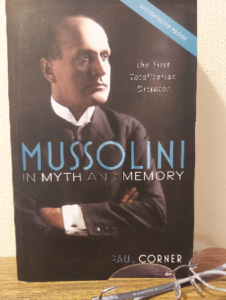I kept thinking as I read that I should know this, know that, know the other. That I should have thought more deeply, understood for myself the depths of a particular point. So thank heavens for Paul Corner’s illumination of the past for us all, and for highlighting the tricks memory, or the transfiguring of memory plays, leading us into a perilous preferred acceptance of what amounts to a myth.
I suppose these days it’s called ‘my truth’ , which alarmingly is gaining credence as an explanation of a lie, or something at least which bears little or no relation to the facts. What it does do is fit in with what others are saying, in other words, their preferred memory, in which facts have been ignored.
So, on to the book: an examination of the brutal reality of the Italian dicator’s fascist regime. Well quite.
For some reason Mussolini has more often than not had a better press than Hitler and Stalin. Indeed, there has been a certain indulgence in that yes, he was a Fascist, but a kindly one, or at least a less than awful one. One that certainly was not like ‘the others’.
In Italy, as elsewhere, he is ofte remembered as strong decisive leader, and who did many good things.
Paul Corner argues against this rehabilitation, not shying away from the corruption, inefficiencies, and the violence of a deeply repressive regime, but for me what was most important was that Mussolini in Myth and Memory went some way to discussing the vagaries of memory, the tendancy in so many of us to rework the facts to fit in with what is comfortable for us.
Is this why some citizens still choose dictatorships? Have they created a mythical memory of the past? Gone is the repression, instead the memory of order and peace overlays the reality. But this preferred view ignores the burgeoning reality of the pressure to conform, to join in group think, to think as others think, or pretend to do so out of fear of ostracisation, cancellation. In the name of this new dogma texts are deemed unacceptable if they refute the group think dictat. Texts are therefore altered, books are burned, the main stream media is biased. From here, the slippery slope to the Totalitarian regime begins. Totalitarianism is not pretty, there might be a strong leadership, strong forces of law and order which rewards rigid obedience but at what cost? None of these beginnings into totalitarianism should be remembered through the lens of ‘my truth.’ The facts must be writ, clear and loud.
Mussolin in Myth and Memory is a warning, a revelation, a profound study of the realities of dictatorships which with time, can merge into acceptable and appealing myth.
Buy it: Mussolini in Myth and Memory – The First Totalitarian Dictator by Paul Corner. OUP Hardback £20.00
Paul Corner is Emeritus Professor of Euopean History and former Director of the Centre for the Study of Totalitarian Regimes at the University of Siena

